It’s never nice when an animal dies, especially if it’s a baby one. Not only is it tragic, but it also leaves you wondering if there was more you could have done as a caregiver. Learning to spot problems early is a vital part of raising baby chicks and by doing this you can prevent chicks from dying. Because with baby chicks? It’s often preventable.
While up to an average of 5% of chicks from a clutch dying can be considered “normal,” baby chicks often die from natural but preventable causes, such as:
- being crushed in a crowd of chicks
- due to environmental factors (such as temperature fluctuations
- illnesses
- poor hygiene
- dehydration
- and more reasons, that will be discussed within this article.
Not only are baby chicks vulnerable, but they’re also susceptible to a whole load of illnesses. But don’t worry if this all seems a bit overwhelming at first. Because in this guide we’ll clearly explain why your baby chicks might die.
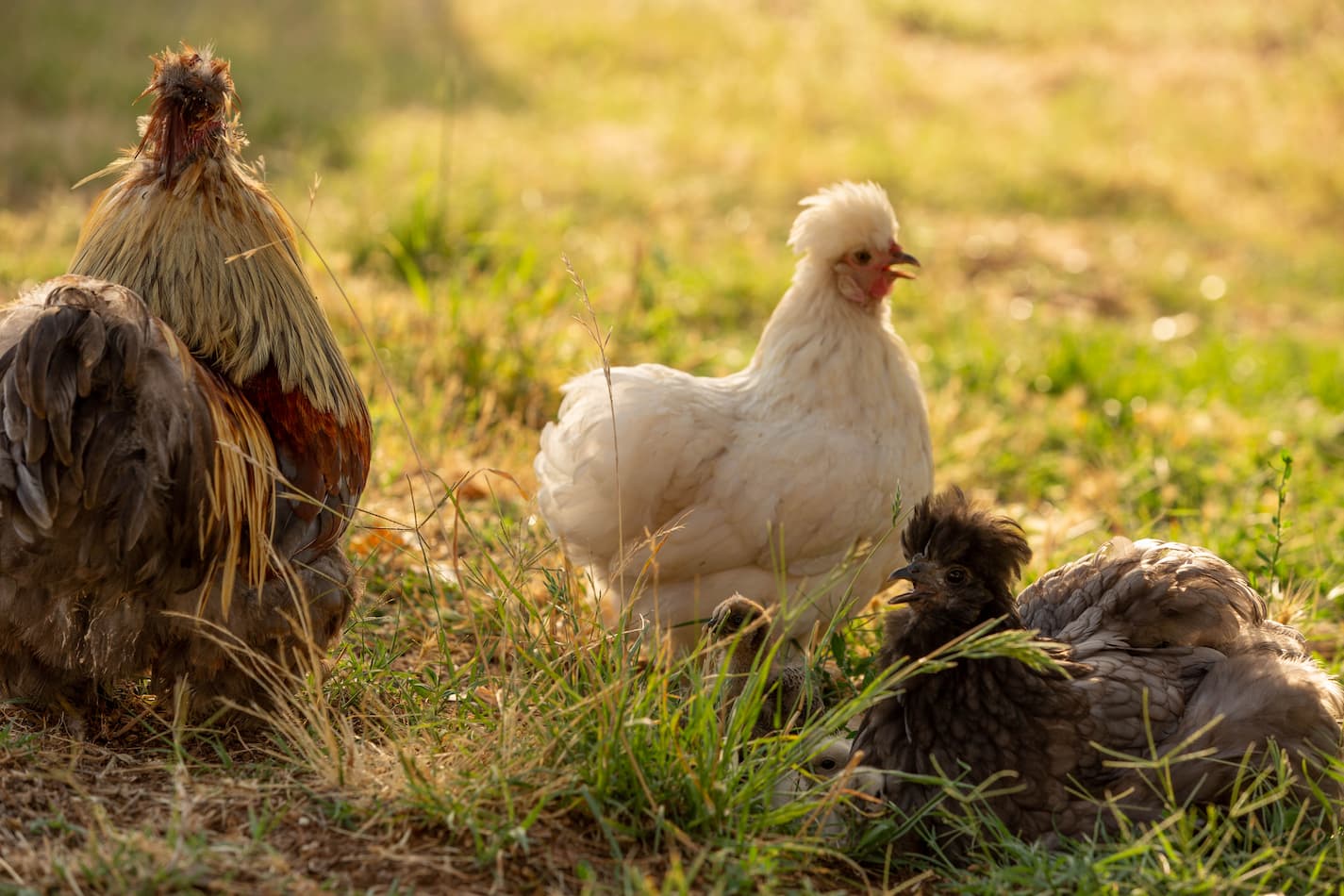
Raising Baby Chicks
When it comes to raising baby chicks, there are a few ways to go about it. The most common and, ultimately the easiest way, is to let a mother hen raise her own. When chicks are with a mother hen she’ll provide for most of their needs. She’ll keep them warm and protected. And she’ll find them food and teach them what to eat.
But if you don’t yet have hens or ones that are suitable for raising chicks, then you’ll probably be raising your baby chicks in a brooder. And raising chicks in a brooder can be a bit more challenging.
This is because you’re completely responsible for your chick’s environment. You have to make sure that they’re not too warm or cold. And that they’re well-fed and hydrated. And if any of these things are incorrect then it can be devastating for baby chicks.
This is because they’re quite delicate in the first few weeks of life, especially in the first week. They don’t have many feathers and their immune system isn’t fully developed yet.
Is it Common for Baby Chicks to Die?
One of the reasons a chicken hatches so many eggs is because, in nature, not all chicks are expected to survive. In fact, it’s considered normal to lose up to 5 percent of a clutch. This means that it’s common for some chicks to die.
But if more than 5 percent of your chicks are dying, this is probably to do with a problem with their care and/or their environment. So recognizing the signs of illness is vital. Because they might be telling you that something in their environment isn’t right.
Signs a Baby Chick is Dying
Baby chicks may or may not exhibit severe distress until they are close to death. The first sign of a problem tends to be that they are quiet. These symptoms indicate that a baby chicken (or chick) may need immediate medical (or veterinary) attention. Symptoms may present alone or with others.
- Sleeping a lot
- Quiet and dull
- Weak, wobbly, or floppy
- Eyes constantly half-closed
- Eyes swollen or enlarged
- Panting, gasping, and sneezing
- Struggles to breathe
- Won’t eat, drink, or void (poop)
- Looks emaciated, very thin, and bony
- Seizures
- Feels cold
- Unresponsive and lifeless
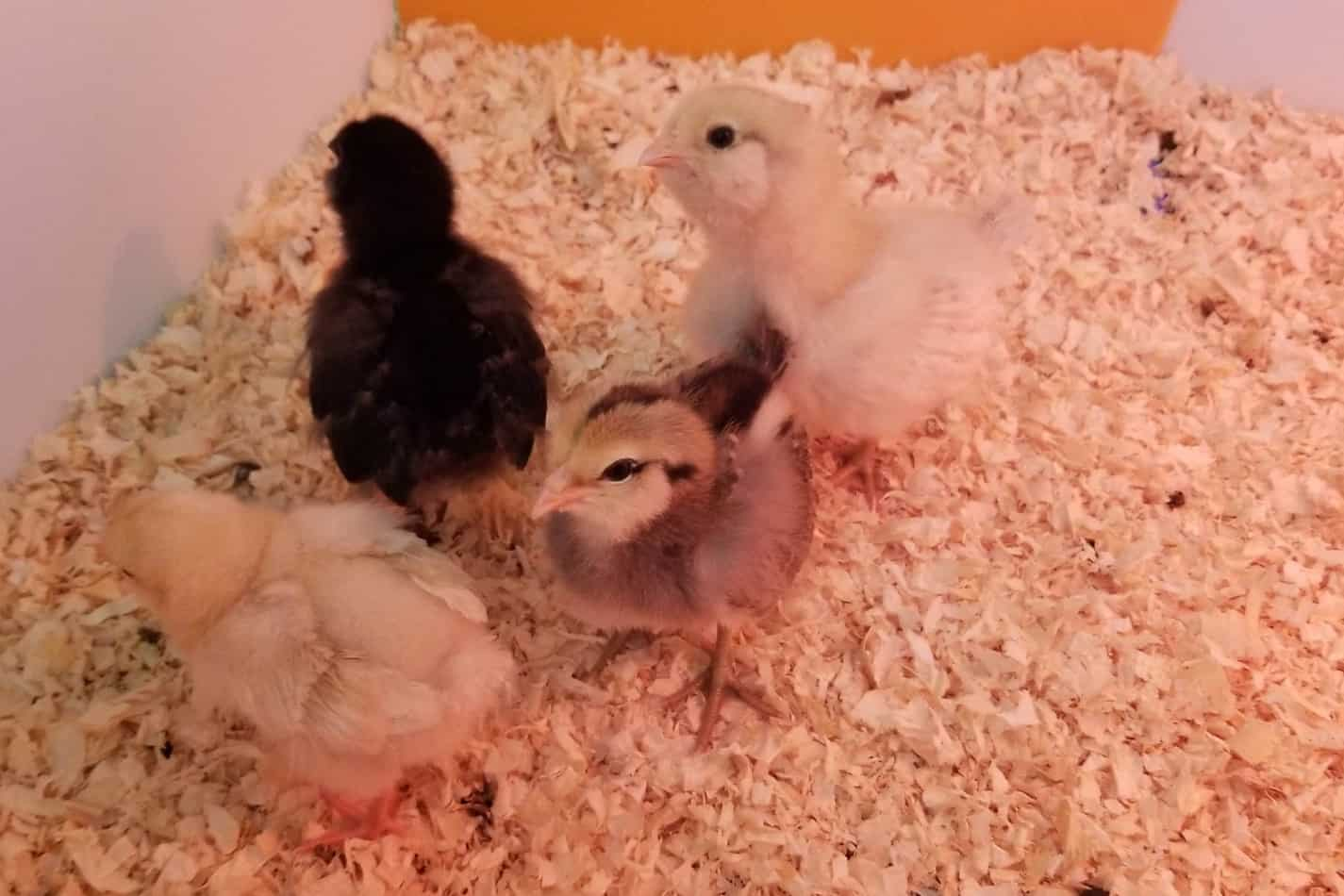
Reasons Why Baby Chicks Die
If your baby chicks are dying then you need to find out why. This will help you to treat them. And it will also prevent other chicks from dying in the same way in the future. So, to get a better understanding of why baby chicks die, we’re going to look at the most common reasons below.
Reason #1: Trauma from Accidents, Overcrowding, and Suffocation
Baby chicks, especially those stored in large quantities, are often at risk of being trampled to death by other chicks. Overcrowding can also turn water dishes into drowning hazards.
Baby chicks are delicate and don’t know a lot about the dangers of the world. And this means that they can die easily through accidents. And they often drown in water containers. So make sure that you give your chicks a shallow or raised waterer to avoid this.
If there are too many chicks living together then they can easily damage each other. Sometimes you might find a dead baby chick that looks like it’s been squashed as a result of overcrowding
And on a more sinister note, if your chicks are left hungry for too long they might even resort to cannibalism. To avoid this make sure that they’re well-fed, and get them outside as soon as possible, or keep them stimulated with greens. And you should always treat any injured chicks quickly so the other chicks aren’t drawn to the blood.
Another common cause of chicks dying is them being held wrong – and it causes them to be squashed or suffocated as a result. Because of this, it’s vital that you learn how to properly hold a chick. Make sure that children who hold their chicks are properly trained on holding them, too. And never let a young child hold a chick unsupervised.
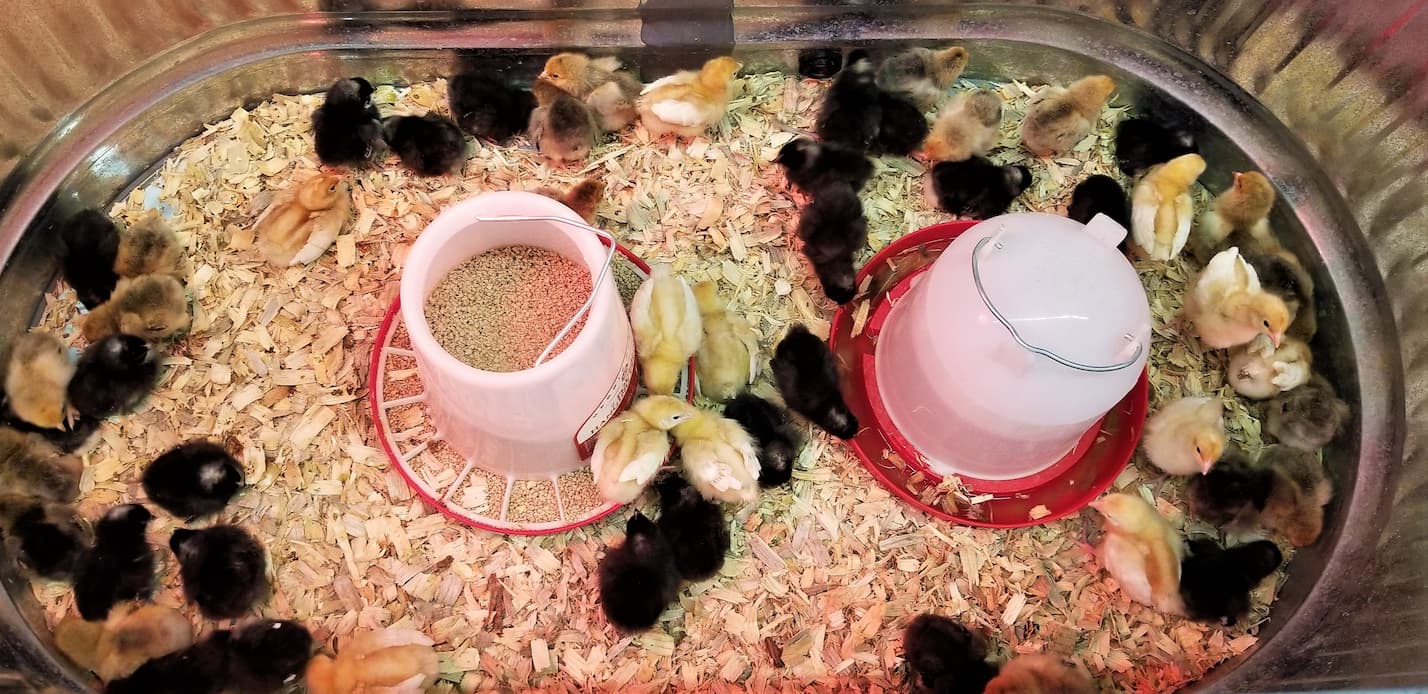
Reason #2: Temperature
Baby chicks are very sensitive to the temperature of their environment. And if they get too hot or too cold, this can kill them in a matter of hours. The ideal temperature for chicks is 90 – 95 degrees in the first week.
Baby chicks don’t have many feathers which means they really feel the cold. When they’re cold they’ll huddle closely together. And they will feel cold to the touch. If your chickens are too cold then you must warm them up by increasing the temperature of their brooder.
When chicks are too hot, they will drink too much water and this will flush out vital minerals from their body. On top of excessive drinking, when chicks are too hot they will pant, and they may also squash together trying to escape the heat. If your chicks look too hot then make the brooder cooler, and always try to leave a cool spot in it for them.
If you’d like to read more on keeping chicks’ temperature just right, make sure you read my article on it here: Light and Heat Requirements for Baby Chicks: The Essential Guide.
Reason #3: Coccidiosis
Coccidiosis is one of the most common causes of death in baby chicks between 4 to 12 weeks old. It’s an infectious parasitic disease that can be transferred through water, food, or droppings of infected chicks. Coccidiosis is treatable.
Okay, so we will talk about parasites later in (it’s reason #9 on this list). But this parasitic cause of chick death is common enough that it gets its own place on my list.
With this condition, chicks will be lethargic and they’ll quickly lose weight and condition. Their feathers will be dull, unkempt, and ruffled. As well as this, their shanks and beaks may turn white, and sometimes there might be blood in their droppings.
You should look at their caeca too. If it’s filled with yellow material, inflamed or enlarged then this is also a symptom of coccidiosis. If you suspect coccidiosis then you isolate any chicks with symptoms. And then you should call your vet for advice about care and treatment.
Reason #4: Fungal Infections
Fungal infections can kill baby chicks very quickly. The most common fungal infection in baby chicks is brooder pneumonia also known as aspergillosis. And this comes from fungus in damp bedding.
If a chick is suffering from aspergillosis then it may be lethargic with a poor appetite. It may also drink more than usual and it may be panting and gasping for air. In severe cases, it could also be wobbly and uncoordinated.
If you think a chick has aspergillosis then you should isolate it from the rest of the clutch. And then you need to call your vet for advice. Unfortunately, there isn’t an easy treatment for this condition.
Reason #5: Bacterial Infections
A common bacterial infection that’s fatal to baby chicks is Mushy Chick Disease, and it’s a yolk sack infection. It’s usually caused by unsanitary hatching conditions and happens when bacteria enter the chick’s body through its naval before it’s healed.
Signs of mushy chick disease include an obvious wound or swelling around the naval. As well as this your chick may smell bad and be depressed, lethargic, and anorexic. If you think your chick has this infection then you should isolate it in a warm comfortable place. Then you need to call your vet for advice.
Unfortunately, bacterial and fungal infections are hard to treat in baby chicks, and often the prognosis isn’t good. This is why good hygiene practices are vital when it comes to raising baby chicks. In these instances, prevention is certainly better than cure.
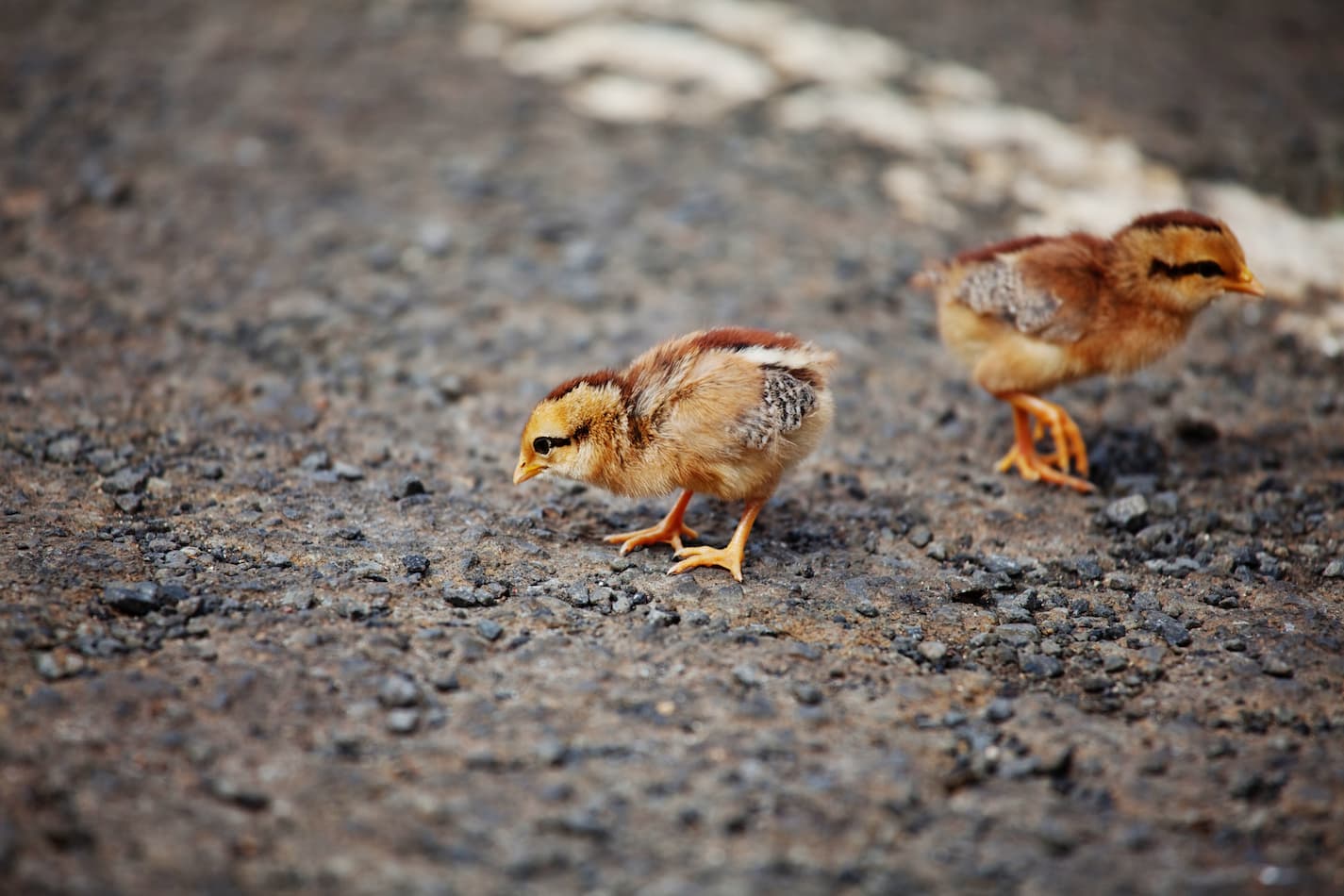
Reason #6: Dehydration
If chicks don’t get enough water they can easily become dehydrated and die. So this is why their water source is very important. Always make sure that they have access to fresh, clean water. Baby chicks dirty the water quickly so you must check it regularly.
When a chick is dehydrated it will usually be quiet and still. It may also pant, ruffle its feathers or open and close its wings.
If you think a chick is dehydrated then you need to put it in a cool place. Make sure that the chick drinks. And you can give it some electrolyte solution. Always follow instructions clearly and talk to your vet about using electrolytes on baby chicks.
Need tips on keeping the chicks’ water clean? Read my complete guide here: How To Keep Baby Chicks’ Water Clean (with pictures).
Reason #7: Poor Diet
If baby chicks don’t have enough nutrition to meet their growing needs then they will become sickly and stunted. Chicks will die unless the nutrition imbalance is fixed immediately.
If baby chicks don’t have a good diet, this also makes them more susceptible to other illnesses. So it’s important to make sure that your chickens are eating and gaining weight. One way to do this is by weighing your chicks each week.
A malnourished chick will look bony and anorexic. It will also be quiet and lethargic and it won’t gain weight. If only one of your chicks is malnourished, this could be a sign of another illness. So you should isolate the chick, speak to your vet, and encourage it to eat.
If your whole flock is malnourished on the other hand then chances are, you’re not feeding them enough. So you should seek professional advice about their diet.
The most common reason for a nutrition or feed imbalance with chicks is if you’re avoiding using commercial chick feed. It’s possible to raise chicks without feed, but you have to do it right.
Here’s how to do it right: How to Raise Chickens Without Feed (And Why it’s Better!)
And just because the next question is going to come up – here’s what you need to know about overfeeding chicks.
Reason #8: Pasty Butt
Pasty butt is when a chicken’s vent (the place where they poop) gets encrusted with droppings. And this is more common with chicks from incubators or hatcheries. If left unattended, then a pasty butt can become fatal because your chick can’t excrete fecal matter.
Pasty Butt is often caused by diarrhea which comes as a result of illness, stress, dehydration, poor diet, or fluctuating temperatures. And this is why it often occurs in chicks that have been shipped. That being said, chicks I’ve bought locally have also had a pasty butt.
Chicks we’ve bought seem to have a 16-17% chance of having pasty butt, no matter where we get them from.
Pasty Butt can be spotted easily with a daily check of your little chick’s butts. If they have a pasty butt, you’ll see an obvious scab-like crust covering your chick’s vent. But don’t just pull it off, you can damage their delicate skin. Instead, gently soak it with warm water first, then wipe it off with a baby wipe or a washcloth. I’ve also heard that you can try using a little bit of petroleum jelly to ease it off gently, though I’ve never had to use it.
Reason #9: Parasites
Parasite infestations can also kill your chicks. This is especially true if parasites are left to get out of hand, or your chicks are living in a contaminated area. A particularly nasty parasite to look out for is the gapeworm. This latches on to a chick’s airways and can cause suffocation.
A chick with gapeworm will have an overall poor condition and it will be shaking and nodding its head a lot. It may also be coughing, panting, and struggling to breathe.
If you suspect your chicks have gapeworm then you need to call your vet for treatment advice. And you’ll need to move your chickens to a different area. This is because gapeworms can live in the soil for up to 4 years.
I’d make a comment about being grateful that gapeworm isn’t as common as other parasites, but I don’t want to jinx my flock.
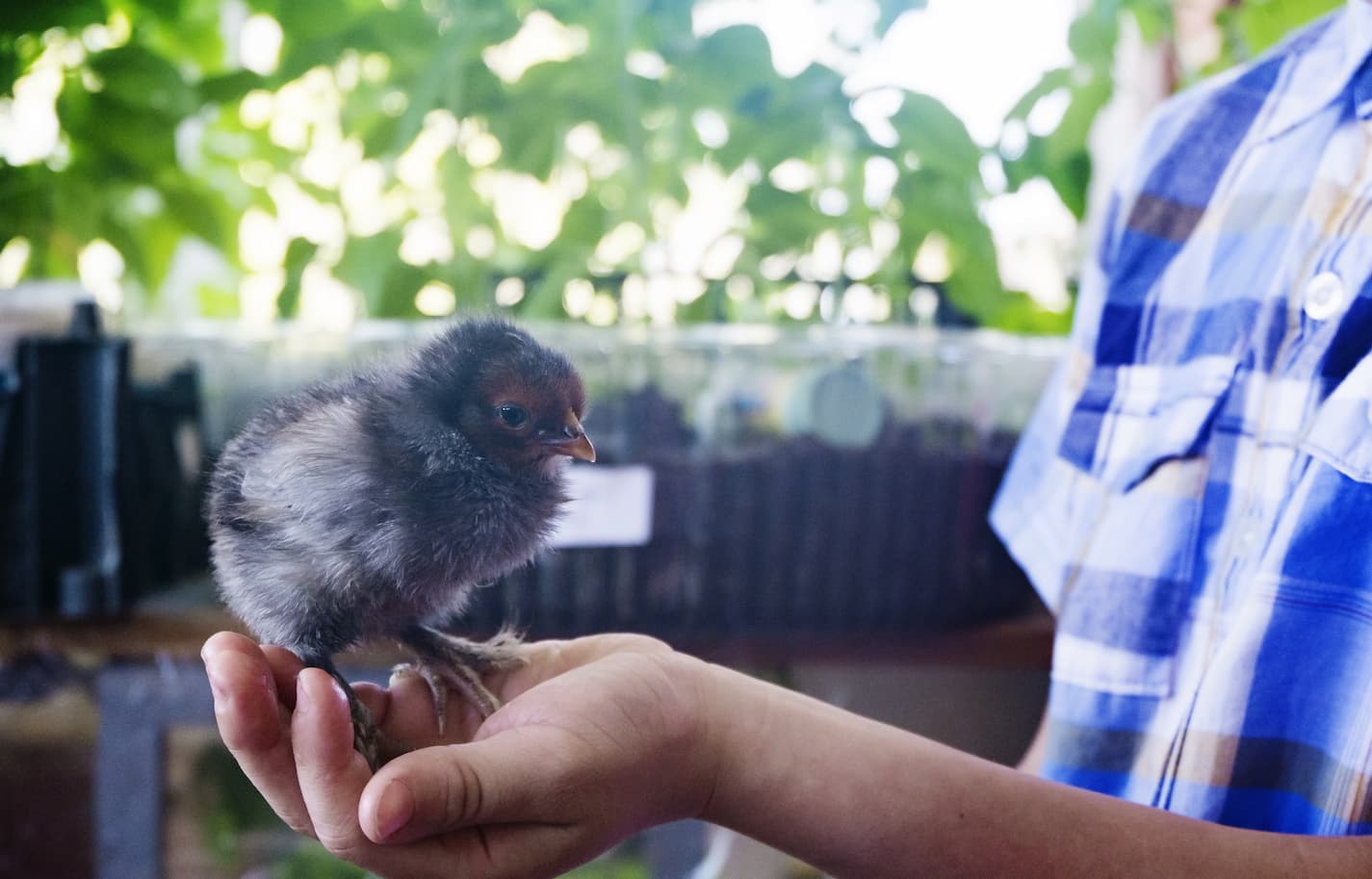
How Do You Know if a Baby Chick is Dying?
Baby chicks are usually lively, vocal, and active. So if you see a chick or chicks that are standing still for a long time or generally looking quiet, then this is one of the first symptoms that something isn’t right.
Other symptoms that can indicate that a chick is very ill or dying include any or multiple of the following.
- Sleeping lots
- Unresponsive and lifeless
- Quiet and dull
- Weak, wobbly, or floppy
- Eyes constantly half-closed
- Eyes swollen or enlarged
- Won’t eat, drink, or void (poop)
- Panting, gasping, and sneezing
- Struggle to breathe
- Feels cold
- Looks emaciated, very thin, and bony
- Seizures
Sometimes, though, chicks will just lay down. So I’ve got a whole other article on chicks that lay down, so you can see when it’s a problem versus when the chicks’ are just sleeping weird. Check it out here.
What to Do for Sick/Dying Chicks?
The first thing you should do if you think a chick is sick or dying is to call your veterinarian for advice. You can also take measures to make sure that the chicks are warm, fed, and properly hydrated.
If you think a chick is dying, then you need to isolate it and make it warm and comfortable. If the chick is responsive, then you should offer it some lukewarm water. It’s better if the water is a bit warm. Cold drinking water can cause shock in a sick or dying chick.
Depending on what your vet recommends, then you could try giving your chicks a specially formulated electrolyte supplement in their water. And once it’s drinking, encourage it to eat. If the chick isn’t interested in normal food, then try giving it some scrambled eggs. Yes, I know it’s weird. But it works.
Table for why Chicks Die – Symptoms Causes and Treatments
As a quick reference guide, we’ve created this table about the most common reasons why chicks die. But please remember to use this table for reference only. For a diagnosis, you should always consult your veterinarian.
| Reason Chicks Die | Cause | Symptom | Treatment |
|---|---|---|---|
| Accidents and Overcrowding | Accidents such as drowning. Or being crushed/ damaged by clutch mates. | Chics will huddle tightly together when they’re cold. When they’re too hot they will pant gasp and drink excessively | Make sure the brooder is at the right temperature. Warm-up cold chicks. And cool down hot chicks and make sure that they’re well hydrated. |
| Temperature | The incorrect temperature in the brooder. | Chics will huddle tightly together when they’re cold. When they’re too hot they will pant gasp and drink excessively | Make sure the brooder is at the right temperature. Warm-up cold chicks. And cool down hot chicks and make sure that they’re well hydrated. |
| Coccidiosis | Infectious Parasitic Disease | Lethargic, dull, and depressed. They may also have a white beak and blood in their droppings. | Isolate affected chicks and call your vet for advice. |
| Fungal Infections -Aspergillosis | Fungal infection from damp/moldy food or bedding. | Lethargic with a poor appetite. Sometimes gasping for air as well as being wobbly and uncoordinated. | Isolate affected chicks and call your vet for advice. |
| Bacterial Infections -Mucky Yolk Sac | Bacterial yolk sac infection from unhygienic conditions. | Lethargy and a wound or swelling around the naval. Chicks may smell bad and be depressed and anorexic. | Isolate affected chicks and call your vet for advice. |
| Poor Diet | Chicks don’t get enough nutrition. | Lethargy, not gaining weight, anorexia. | Increase food and get professional advice about your chicks’ diet |
| Pasty Butt | Poor diet, stress, diarrhea, temperature fluctuations. | Dried scab-like crust blocking the vent. | Remove the crust gently by soaking or with a little petroleum jelly. |
| Parasites -Gapeworm | A parasite that invades a chick’s airways. | Coughing, panting, and discomfort around the airways. | Isolate affected chicks and call your vet for advice. |
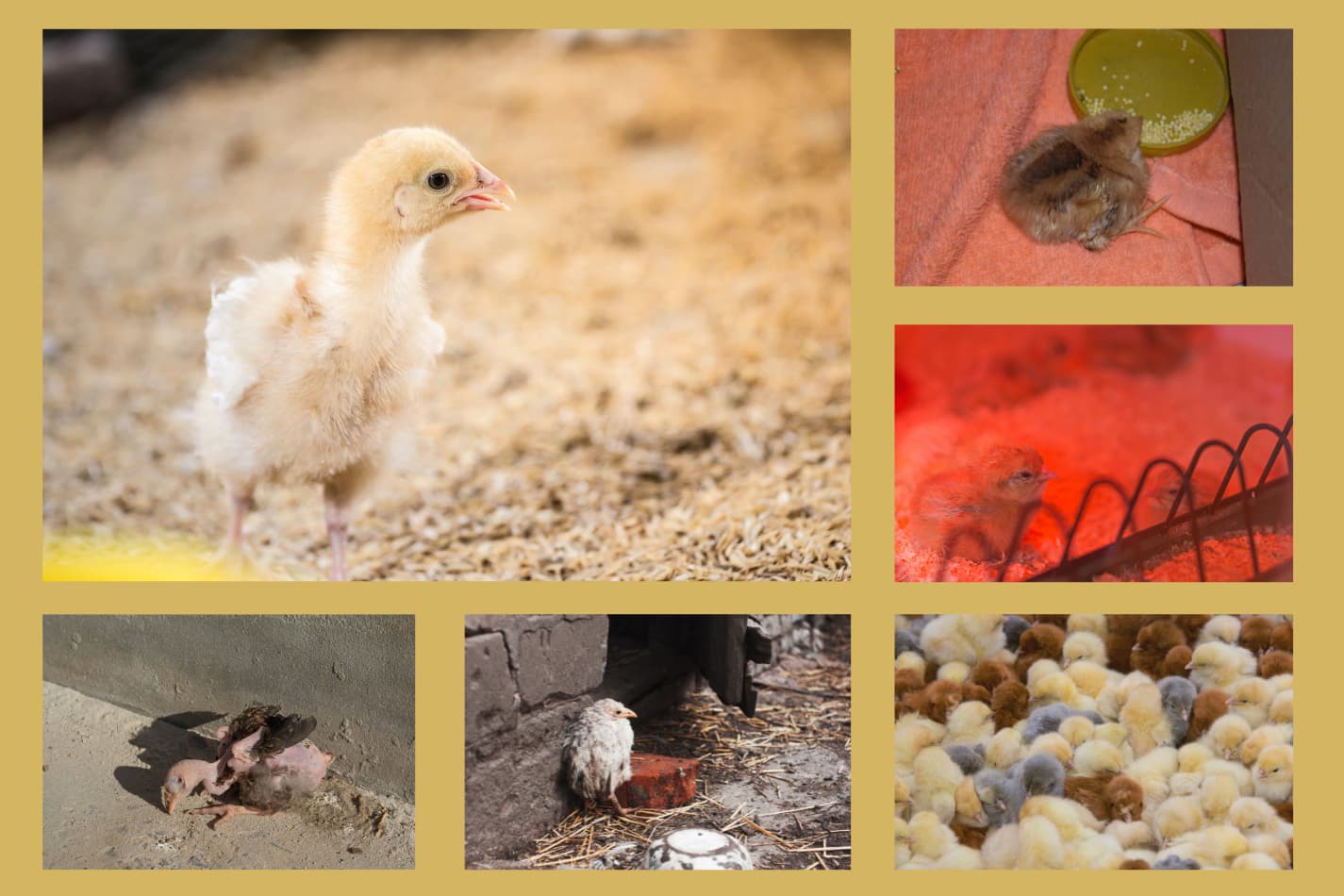
What Would Cause a Chick to Die Suddenly?
Baby chicks are fragile little things so it’s quite easy for them to die of shock. If chicks die suddenly, this could also be due to genetic reasons. Or even because of issues related to their incubation and hatching.
Baby chicks are very sensitive to their environment. This means that they can die very quickly due to things such as the cold and dehydration. Sometimes even a cold draft can be fatal. In other cases, if you find a dead chick that looks perfectly healthy, potentially it may have been squashed or suffocated by its clutch.
Traveling with a baby chick from the store to home can also be super traumatic on chicks. So if you’ve just gotten your flock from a store, keep in mind that the trip could have proven fatal. In that case, make sure you talk to the store, as each store has its own policies on chicks and livestock.
How to Keep Baby Chicks Alive
The best way to keep your baby chicks alive is by following good hygiene practices. More often than not, illnesses and diseases come from contaminated or unsanitary living conditions. With baby chicks especially, preventing illness is much easier than curing them.
To keep your chicks alive and thriving then you also have to pay close attention to their environment. Fluctuating or incorrect temperatures can easily kill baby chicks.
And even if your chicks are being raised under a hen, it’s always a good idea to have a brooder for backup. You can use it to house sick chicks or even chicks that have been rejected by their mother.
Key Takeaways on Chicks Dying
Life and death are a part of keeping animals, so don’t be dismayed when your baby chicks die. Raising baby animals is something that’s best learned through experience. And as long as you’re willing to learn then eventually you’ll get it right.
And finally, we can’t stress enough that this article isn’t veterinary advice. We’re simply sharing our experience. You must always consult an animal care professional if you’re in doubt about the health of your chicks.
Resources
Learning from your own experience is essential, but learning from others is also intelligent. These are the sources used in this article and our research to be more informed as homesteaders.
- AnimalDVM. “Aspergillosis in Chickens.” PoultryDVM, www.poultrydvm.com/condition/aspergillosis.
- “Coccidiosis & Your Chickens – What You Need to Know.” Freedom Ranger Blog, 15 Nov. 2019, www.freedomrangerhatchery.com/blog/coccidiosis-your-chickens-what-you-need-to-know.
- Clay, R. E. “How to Raise Chicks.” Ohio Boys & Girls’ Club Poultry Club, 1925, kb.osu.edu/bitstream/handle/1811/90057/1/CFAES_OSUE_18_8_rev_1925-01.pdf.
- “Gapeworm Infection in Chickens.” PoultryDVM, www.poultrydvm.com/condition/gapeworms. Accessed 25 Aug. 2021.
- Pitesky, Maurice. “Understanding Failure to Thrive in Baby Chicks – Watching for Clues Can Save Your Flock.” Chicken Whisperer Magazine, www.chickenwhisperermagazine.com/nutrition/understanding-failure-to-thrive-in-baby-chicks-watching-for-clues-can-save-your-flock.
- Sanderson, Rebecca. “Sick Chicks: 7 Common Illnesses You May Encounter.” Backyard Poultry, 29 July 2021, backyardpoultry.iamcountryside.com/feed-health/sick-chicks-7-common-illnesses-you-may-encounter.
- Vjppoultry. “Baby Chick Died Suddenly.” VJP Poultry, 25 May 2018, vjppoultry.com/tag/baby-chick-died-suddenly.
